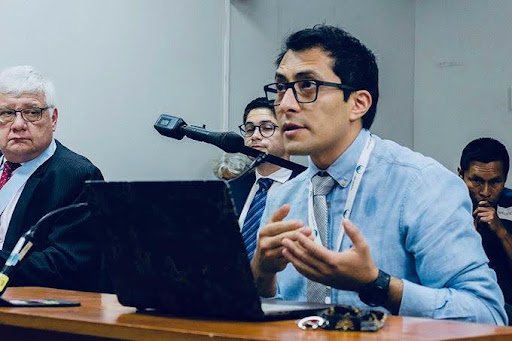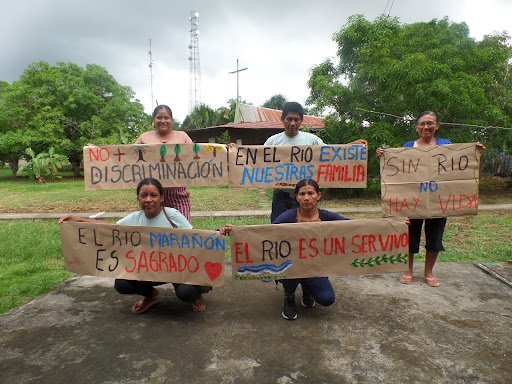Earth Law Center Advocates for the Rights of Peru's Marañón River
Update:
March 18, 2024: In a landmark ruling, the Peruvian Court of Nauta has recognized the rights of the Marañón River and appointed a federation of Indigenous communities as its guardians. The Marañon River, a magnificent free-flowing river that runs for 1,600 miles from the snowy peaks of the Peruvian Andes into the heart of the Amazon, has thus become the first river in Peru to be declared as having rights. Read more about the ruling in this subsequent blog post.
Original article:
The Marañón River, long storied as the primary source of the Amazon River, has begun taking center stage in national and international discussions about the Rights of Nature and human environmental rights of Indigenous groups. A major court ruling on a case against Peruvian state oil company Petroperu, as well as the Regional Government of Loreto and other state entities, is expected soon. It has the potential to establish the river as a rights-bearing entity, which would make it the next in a growing list of rivers in Latin America and elsewhere around the world to have been recognized as having rights.
“If this is the case, we could say that a new stage in environmental law is opening in Peru,” said Constanza Prieto Figelist, director of Earth Law Center’s (ELC) Latin America Program.
With its headwaters about 160 kilometers northwest of Lima, the Marañón has been subjected to decades of adverse environmental impacts, including contamination from illegal gold mining, as well as dozens of oil spills from the NorPeruano Pipeline. Diverse Amazonian Indigenous groups, such as the Kukama Kukamiria, Awajún, and Wampis, have suffered the ecological and health effects of these spills and have led the effort to protect the river from further damages, including as plaintiffs in multiple lawsuits. “We have no other source of drinking water,” said Mari Luz Canaquiri Murayari, president of the Huaynakana Kamatahuara Kana (HKK), an Indigenous women’s Kukama federation with representatives from 29 communities, in this article by David Hill. “But there have been over 50 years of oil spills and they are killing us slowly.”
The river, like other Andean tributaries of the Amazon, now also faces the cumulative danger of numerous planned hydroelectric projects in its basin. These threaten an array of damaging impacts to resident Indigenous communities, aquatic life, and normal silt deposition, which is an important factor in both ecosystem stability and the functioning of the carbon cycle.
In order to support the campaign to protect the Marañón River and recognize its rights, ELC’s Latin America team has been working on multiple fronts of legal advocacy.
Amicus Curiae Brief in the Lawsuit for the Protection of the Marañon River
On November 9, 2023, in Nauta, Peru, ELC’s environmental policy and climate change expert Javier Ruiz was present as amicus curiae at the only in-person hearing on the case. Ruiz delved into the viability of judicially recognizing the river as a subject of rights and urged the judge to apply principles of international environmental law as the precautionary principle to resolve the case. The Kukama Kukamiria’s constitutional lawsuit, brought with support from ELC, Instituto Defensa Legal, and International Rivers, seeks to grant the Marañón rights including those to exist, to flow, to be free of contamination, and to the restoration and regeneration of its natural cycles.
ELC’s Javier Ruiz speaks at the in-person hearing on the case.
At the hearing, the Indigenous women defenders of the Marañón River, who are plaintiffs of the case, presented the damages they have incurred due to the continuous oil spills in the river, arguing that constitutional acknowledgment of the river’s rights is a necessary step to prevent the continuation of such harms. As noted in this article in El País, these women river defenders have “witnessed the many ways in which the pollution of the Marañón affects the lives of the Kukama, especially women: from skin diseases, pregnancies that end in spontaneous abortions, to cancer.”
Maritza Quispe Esq. and Juan Carlos Molleda Esq., both attorneys of the Instituto Defensa Legal representing the plaintiff, HKK, presented the allegations of form and substance for which the Marañón River should be recognized as a subject of rights.
“As a subject of rights but unable to speak in its own defense, the river would need a guardian who would look after its interests,” notes this article on the case, co-authored by Ruiz, in Peruvian outlet La República. “In the lawsuit, the women of Huaynakana have asked the court to appoint the Kukama people as guardians of the Marañón.”
Escazú Agreement Trainings for Indigenous Women River Defenders
On November 4-5, 2023, in coordination with strategic partner NGO Defensa Ambiental, ELC conducted an in-person training workshop on the rights of access to information, participation, and justice in environmental matters for about 30 members of the HKK of the Marañón River.
HKK members display their signs expressing kinship and support for the Marañón River.
Over the two days, ELC’s Javier Ruiz facilitated discussions on environmental rights for women defenders of the Marañón River, including the Rights of Nature. The program, which has also been held with Indigenous communities in Chile, aims to connect these Indigenous women river defenders with rights under the Escazú Agreement, a regional treaty signed by some two dozen countries in Latin America and the Caribbean. Although Peru itself has not yet signed this agreement, the training helps empower the Indigenous women to advocate for the Peruvian government to join it.
The Escazú Agreement trainings are crafted to address barriers to environmental justice including:
the remote locations of many Indigenous communities, placing them far from political centers, courts, and ally groups
ethnic or cultural discrimination that creates barriers to their participation in environmental decision-making
gender-based discrimination at both regional and local levels, which excludes Indigenous women from the education, mobility, and group coordination necessary to assert their rights participation and environmental justice
ELC’s Latin America team plans to expand the Escazú Agreement trainings to other interested Indigenous communities in the Amazon and beyond.


